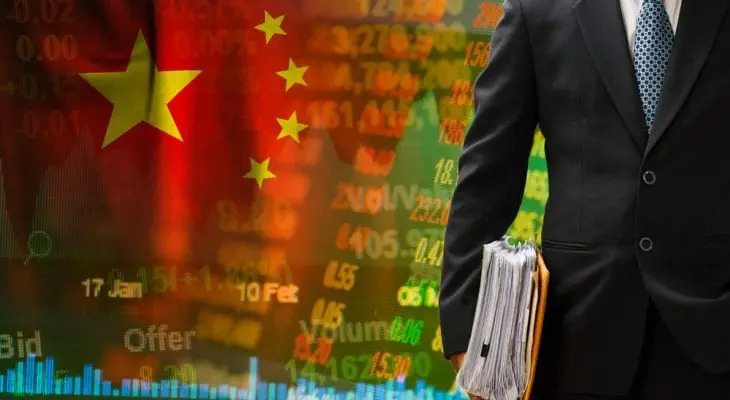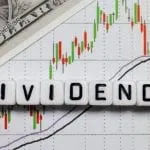Invest in China with Two Dividend-Paying Funds
By: Paul Dykewicz,

Invest in China with two dividend-paying funds that have been on the rise and offer diversification with growth stocks from different countries.
Those who invest in China through two dividend-paying funds that have risen strongly in recent months may see them climb further amid encouraging data from clinical trials for an effective COVID-19 vaccine, talk of a new U.S. economic stimulus package and hope that President-elect Joe Biden’s prior diplomatic experience may provide a stabilizing influence with U.S. trade partners to reduce uncertainty for investors. However, China may need to curtail its aggressive behavior in the South China Sea and cut back on its intellectual property theft, among other transgressions, to avoid the kind of conflict that developed with outgoing U.S. President Donald Trump.
Kevin O’Leary, the chairman of O’Shares ETFs and a wealthy panelist on the “Shark Tank” television program, said he wants an even playing field to do business in China. If Chinese companies are able to litigate in the United States for intellectual property and other matters, U.S. companies should be allowed the same access to legal redress in China, O’Leary said in recent podcast.
Those Who Invest in China with Two Dividend-Paying Funds Would Be Helped by Creating a Fair Business Climate with the United States
“I’d be happy to delist all their companies off the exchange and not give them access to the courts until they wake up and give us the same because that’s exactly where we are,” O’Leary said. “We’re in the same boat.”
For 25 years, O’Leary said the current system that restricts American companies from operating in China and gives Chinese companies far greater rights in the U.S. system has been drastically unfair. It is time to rectify the business conditions that are tilted greatly in China’s favor, he added.
“I’m not on board for the political solution,” O’Leary said. “I want hardcore head squeezing because that’s what the Chinese understand.”

Paul Dykewicz completes an interview with Kevin O’Leary, chairman of O’Shares ETFs, in Las Vegas.
O’Shares ETFs offers a rules-based exchange-traded fund called O’Shares Global Internet Giants ETF (AMEX:OGIG) that is designed to give investors exposure to large global companies that draw most of their revenue from the internet technology and e-commerce business segments that offer above-average growth potential. O’Leary champions that ETF, cites its strong share-price gains in the past year and touts how it seeks to track the performance, before fees and expenses, of the O’Shares Global Internet Giants Index.

OGIG has jumped 7.29% in the past month, 10.57% in the last three months, 91.11% so far in 2020 and 96.30% for the past 12 months, according to Morningstar. The ETF features 61.71% U.S. equities, 38.27 non-U.S. equities, trades at a price-to-earnings ratio of 54.82 and offers a 0.07% dividend yield. The dividend yield is not much but it is competitive with the interest paid by U.S. commercial banks that lately have averaged 0.04% for checking accounts, 0.05% for savings accounts and 0.07% for money market acc0unts, according to the latest data from the Federal Deposit Insurance Corporation (FDIC).
Half of OGIG’s top eight holdings, as of Nov. 25, featured Chinese companies. Among the top four, two of them are headquartered in China. OGIG’s four largest holdings and their weightings in the ETF, also as of Nov. 25, were Seattle-based Amazon.com Inc. (NASDAQ:AMZN), 5.08%, China’s Group Holding Ltd. (NYSE:BABA), 4,84%; Mountain View, California-based Alphabet Inc. (NASDAQ:GOOG), 4.01%; and China’s Tencent Holdings Ltd. (OTC:TCEHY), 3.93%, according to Morningstar. Facebook Inc. (NASDAQ:FB), of Menlo Park, California, ranked fifth to account for 3.93% of OGIG’s holdings.
Scaramucci Cites Serious Problems in Hong Kong, Taiwan and China
Anthony Scaramucci, founder and managing partner of Skybridge Capital, said during the podcast with O’Leary that key U.S. trade issues involve Hong Kong, Taiwan, China and the latter country’s use of concentration camps to persecute ethnic and religious minorities.
The United States, Canada and other western countries should support the freedom movement in Hong Kong, said Scaramucci, who served for 11 days as President Trump’s White House communications director. New laws passed in Hong Kong will create dissension there, said Scaramucci, who added that its residents may seek refuge in the United States and elsewhere amid China’s crackdown on freedom.
China’s construction of military installations around the South China Sea is a violation of the United Nations Charter and international law, Scaramucci said. President-elect Joe Biden has been “pretty forceful” in the past on such transgressions and he “needs to maintain” that stance when he becomes president, Scaramucci said.
Leaders in the United States and Europe Should Collaborate to Oppose ‘Concentration Camps’ in China
As far as the rising tensions with other nations and China, along with the latter country’s threats against Taiwan and aggression in the South China Sea, Scaramucci said he supports the United States and its population of 330 million people teaming up with European nations to build a coalition of 1 billion people to boost their combined clout to address the increasing risks.
“I think that the 1-billion-person marketplace might be able to provide more leverage,” Scaramucci said.
To oppose China’s concentration camps, the “global society” will need to figure out what to do about that “serious tragedy” taking place in that nation, Scaramucci said. Steps could be taken by the leaders of other nations to speak out boldly against human rights abuses in the world’s most populous country, Scaramucci added.
Pension Fund Chairman Carlson Discusses How to Invest in China with Dividend-Paying Fund
“I continue to recommend T. Rowe Price New Asia (PRASX) for investing in Asian emerging markets generally and China in particular,” said Bob Carlson, head of the Retirement Watch investment newsletter and chairman of the Board of Trustees of Virginia’s Fairfax County Employees’ Retirement System with more than $4 billion in assets. “The fund concentrates in a relatively few stocks of companies with strong growth rates but that are selling at reasonable prices.”
The mutual fund, offered by T. Rowe Price (NYSE:TROW), is about 47% invested in China-based companies, with another 13% in Taiwan and 10% in Hong Kong, Carlson said. The rest of the portfolio is primarily in other Asian-based companies that are likely to benefit from continued growth in China’s economy and its companies. Major holdings in the fund include Alibaba Group, 10%; Tencent Holdings, 9%; Samsung Electronics, 8%; Taiwan Semiconductor, 7%; and AIA Group, 4%. The fund offers a projected dividend yield of 0.62%, according to DividendInvestor.com forecasts.
“Asia, led by China, is likely to have the fastest-growing economy of any region around the globe,” Carlson said. “The region has less debt than most of the rest of the world and is better positioned to rebound from the pandemic.”

Chart courtesy of www.stockcharts.com
PRASX added to its favorite holdings during the stock selloff last spring to gain exposure to companies that had the potential to emerge from the crisis in stronger positions, Carlson continued. The fund owns 72 stocks and almost 50% of its portfolio is in its 10 largest positions, he added.
Plus, PRASX has produced returns of 7.19% in the past month, 10.12% in the last three months, 24.2% thus far in 2020 and 30.06% in the past 12 months, according to Morningstar. It is a mutual fund I personally have owned for many years as a way to invest in Asia, while leaving the selection of stocks to the portfolio managers at PRASX.

Pension fund Chairman Bob Carlson answers questions from Paul Dykewicz in an interview before social distancing became the norm after the COVID-19 outbreak.
Wall Street Money Manager Shares Her Best Ways to Invest in China
“Chinese companies were a complete no-fly zone for me for years because the accounting standards don’t encourage a lot of long-term confidence,” said Hilary Kramer, who hosts a national radio program, “Millionaire Maker,” and heads the GameChangers and Value Authority advisory services. “Then the trade war raised the threat that these stocks could get delisted at any moment if hostilities escalated. The accounting hasn’t improved — just take a look at the failed Ant IPO — but the geopolitical situation seems to be calming down, which makes a few of these companies attractive under the right conditions.”
Kramer added that subscribers in her IPO Edge trading service have done “very well” investing in Agora Inc. (NYSE:API), a non-dividend-paying software company in Shanghai, China, and Li Auto Inc. (NYSE:LI), an electric vehicle manufacturer in Beijing, China, to seize short-term trading opportunities. Neither pays a dividend at this time and whether they become “great companies” to hold forever is hard to say until the “nebulous corporate reporting” by Chinese companies clears up, Kramer added.

Chart courtesy of www.stockcharts.com
There is money to be made buying low, holding on for a few weeks or months and letting momentum do the work, Kramer counseled. Her subscribers “doubled” their money in LI before the U.S. presidential election when the trade war was a constant risk, she continued.

Chart courtesy of www.stockcharts.com
“There was a risk that we would need to exit the position at any time… it just didn’t play out that way,” Kramer said. “Now that threat has receded. About 8-9% of all stocks that have gone public this year are from China. That side of the universe is opening up again, not as a buy-and-hold proposition, but as the Pacific chill keeps thawing, we’ll have more options.”

Columnist and author Paul Dykewicz interviews money manager Hilary Kramer, whose premium advisory services include 2-Day Trader, Turbo Trader, High Octane Trader and Inner Circle.
Hong Kong Online Brokerage Ranks Among the Best Ways to Invest in China
Futu Holdings (NASDAQ: FUTU), a Hong Kong, China-based holding company in digitized brokerage and wealth management, is recommended in Fast Money Alert, co-led by experienced stock pickers Jim Woods and Mark Skousen.

Chart courtesy of www.stockcharts.com
Woods, who heads the Successful Investing and Intelligence Report investment newsletters, as well as the Bullseye Stock Trader advisory service, commmented that he likes Futu as a provider of online brokerage services and margin financing services through software and websites. Futu further offers investing services through its digital brokerage platform under the name of Futu NiuNiu.
The company’s offerings also include trade executions and margin financing that allow its clients to buy and sell securities such as stocks, warrants, options and exchange traded funds (ETFs) across markets, Woods said. As a result, Futu helps make capitalism possible in China and Hong Kong, he added.
The stock is paying off for its shareholders by rising 336.82% in the past year. That performance ranks among the top 2% of all publicly traded companies. Unfortunately for income investors, the growth stock currently does not pay a dividend and may not do so for the foreseeable future while producing such strong share-price appreciation.

Paul Dykewicz interviews Jim Woods before the COVID-19 social distancing restrictions.
People Who Invest in China Should Not Need to Change Course Under a Biden Administration
America’s China policy may continue of the escalation of trade disputes that gained attention during the past few years, said University of Chicago Associate Professor Paul Poast. The tariff war may not remain as intense as it became under President Trump but mounting concerns about China’s theft of U.S. intellectual property and potential exploitation of its status as a developing country are bipartisan issues that will remain relevant regardless of who is the president.
The COVID-19 pandemic has worsened recently and, as of Nov. 27, has taken the lives of 263,462 people in the United States among a total of 12,886,202 cases, including President Donald Trump, whose condition became serious enough to require his hospitalization Friday, Oct. 2, until Monday, Oct. 5. Worldwide COVID-19 cases have totaled 61,116,796 and led to 1,434,725 deaths, as of Nov 27, according to Johns Hopkins University. America has reported the most cases and deaths of any country.
Those who want to invest in China amid COVID-19 have two funds available that also pay modest dividends. The funds leave the choice of stocks to professional money managers who can monitor the day-to-day economic, political and market developments to take those weighty worries away from investors who simply want profitable investments without the headache of deciding which holdings to buy and sell as conditions change.











